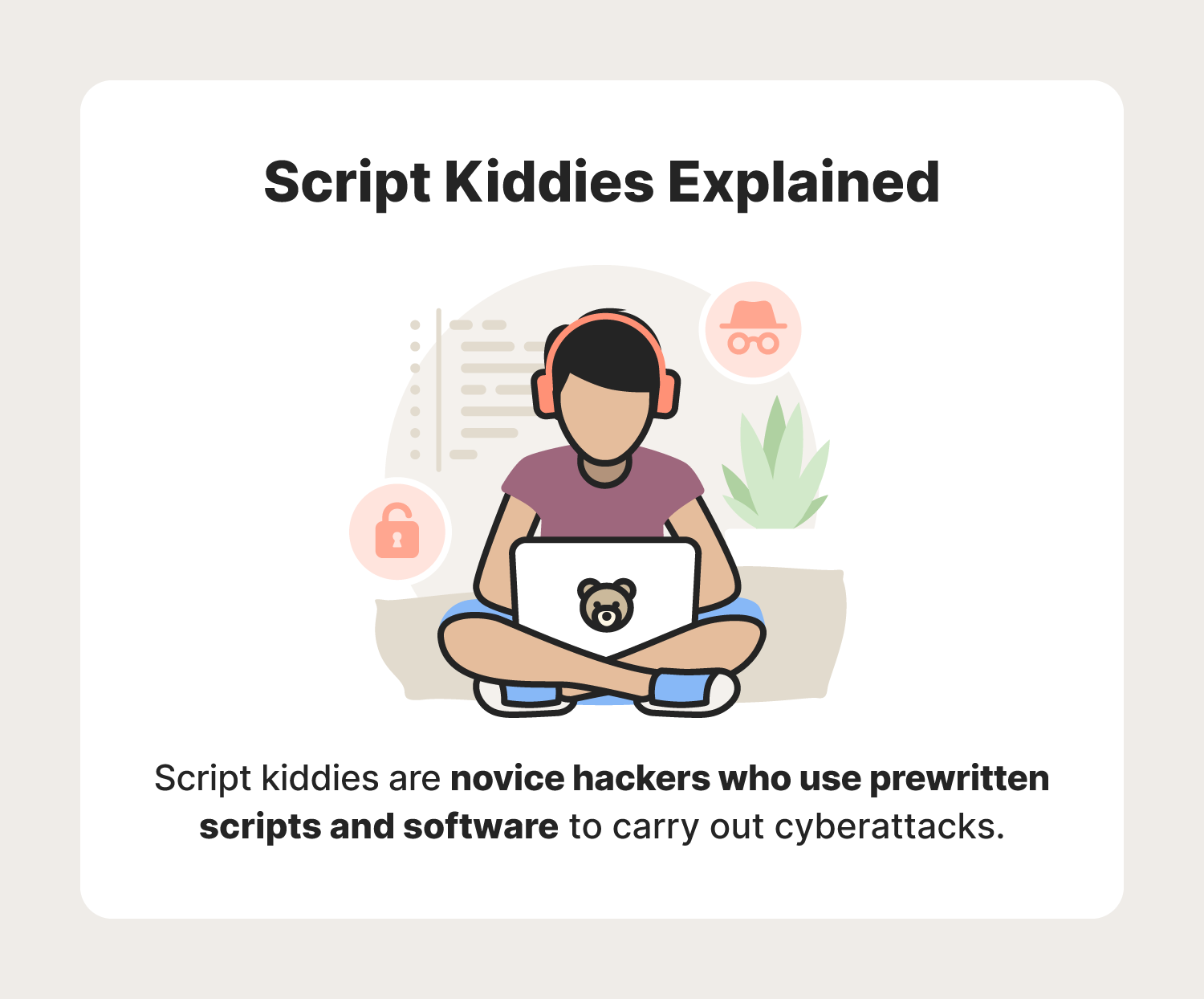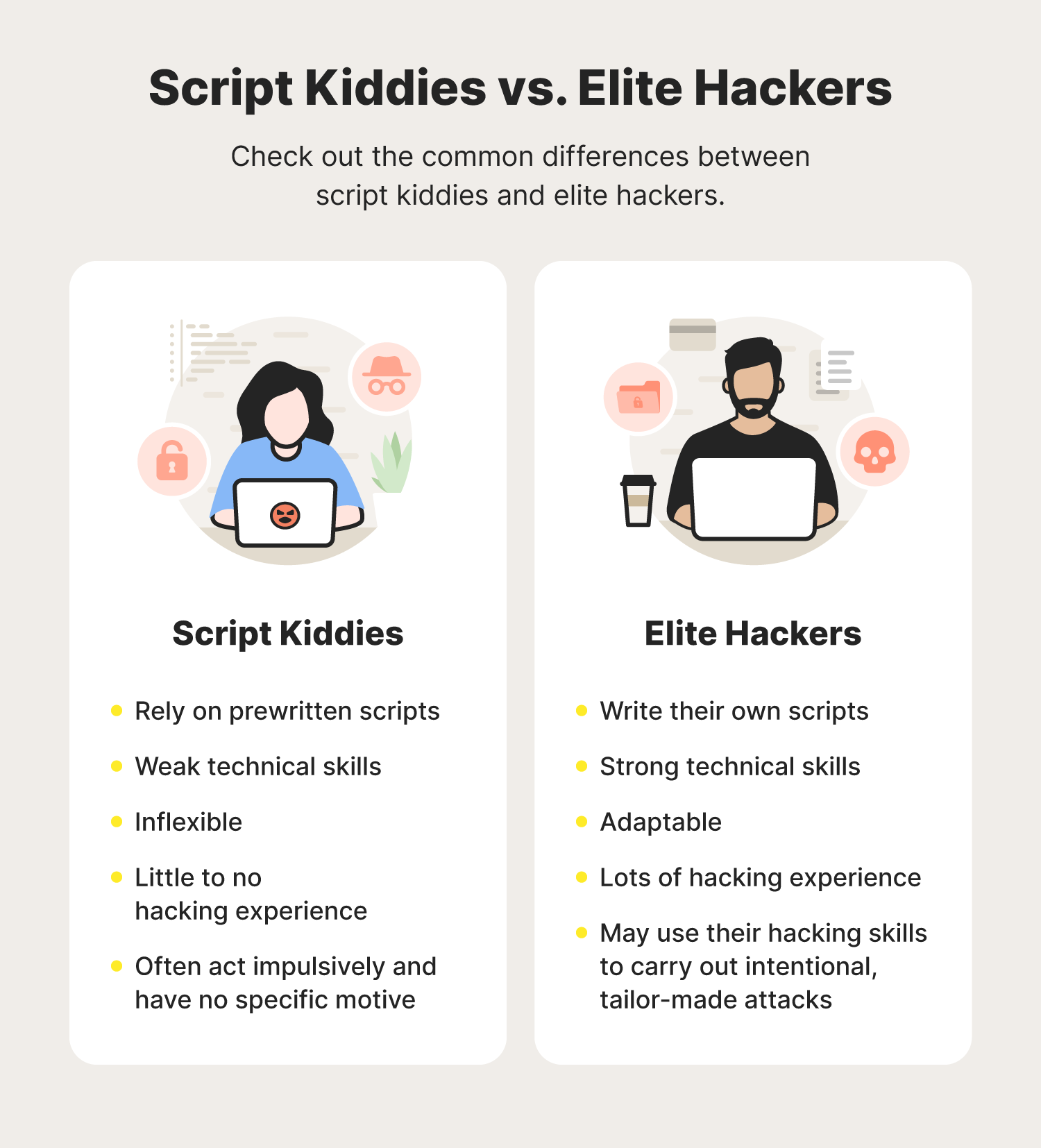What is a script kiddie? Definition + examples
Script kiddie definition
"Script kiddie" is a demeaning term used to describe novice hackers who use existing scripts and software to carry out cyberattacks.

Cybersecurity statistics show that there are around 2,200 cyberattacks per day.
But who's actually behind them? Turns out, hackers fall on a spectrum of experience levels from advanced to novice — script kiddies are on that novice end, but are no less dangerous.
You can think of a script kiddie as someone who has stumbled across a superhero suit. While they may not be able to do as much as the superhero themselves, they suddenly have access to more power than they know what to do with.
This can be dangerous, as their reckless attacks and lack of experience can cause real damage and may even get them into trouble.
Continue reading to learn more about script kiddies, how they work, and how you can help protect yourself.
How script kiddies work

As the term suggests, script kiddies, also known as skiddies, utilize prewritten scripts and software to carry out their hacking endeavors. Experienced hackers, on the other hand, may write their hacking scripts from scratch, custom-built for their intended target.
Believe it or not, the internet is flooded with prewritten hacking scripts and hacking tools available for use or purchase, making it easy for amateur hackers to find the specific hacking script they’re looking for. These include password attack tools and denial of service (DoS) tools.
With that being said, there is no guarantee that a prewritten script will work how the script kiddie hopes. This can cause them to fail at achieving their hacking goal or may lead them to do more damage than they ever intended.
It's important to remember that not all low-level hackers are script kiddies. Other types of hackers may try to learn the basics of hacking rather than relying on premade scripts.
Characteristics of a script kiddie
Now that you’ve answered the question “What are script kiddies?” and have learned how they work, let’s take a look at some of the common characteristics of a script kiddie hacker and their attacks:
- Inexperienced: In many cases, skiddies will have little to no technical computer skills.
- Indiscreet: Because most script kiddies do not know how to mask an attack, their attacks will likely be detected much faster than one carried out by an experienced hacker. This may lead cybersecurity experts or law enforcement to easily discover their identity.
- Reckless: Due to their lack of technical knowledge, script kiddies may run a prewritten script that could end up causing more problems than they expected.
- Impulsive: Script kiddies often act impulsively, using whatever prewritten script they can find for fun rather than having a specific motive.
- Attention-seeking: In some instances, skiddies may look toward hacking as a way to gain notoriety, hoping that carrying out a cyberattack can help them capture attention from their peers or the news.
Of course, not all script kiddie hackers are alike, and their intentions may vary. After all, the impact of a script kiddie attack depends entirely on the quality of the hacker’s script they use.
Script kiddies vs. elite hackers: What’s the difference?

With the traits of a script kiddie in mind, you may wonder how they differ from elite hackers. Script kiddies and elite hackers differ in three main ways:
- Skill level: Unlike script kiddies, real hackers are much more skilled. These experienced hackers write their own customized scripts based on the type of hacking they wish to partake in. On the other hand, script kiddies are limited to whatever they can find online.
- Intention: Script kiddies often carry out attacks for notoriety or simply the thrill of it. Alternatively, elite hackers often have much more meaning behind their attacks, spending large amounts of time formulating their scripts. Depending on the type of hacker, these experienced individuals may use their skills for different reasons, from working as a cybersecurity professional to carrying out ransomware attacks for monetary gain.
- Experience: Lastly, elite hackers have hacking experience that skiddies likely do not. This additional experience helps elite hackers cover their tracks and protect themselves during hacking exploits. Additionally, experienced hackers can use their technical knowledge to adapt on the fly and respond to obstacles that may get in their way.
To sum up these differences, elite hackers are highly skilled and write hacking scripts from scratch, whereas script kiddies are inexperienced and exploit scripts written by elite hackers.
Script kiddie attack examples
Although script kiddies are known for their lack of skills, they may still be able to do some serious damage if using a high-quality hacking script. Here are some examples of common attacks that can be carried out by script kiddies:
- Website defacement: Often for trolling purposes, a script kiddie may use a hacking script to penetrate a website and alter or delete its existing content. This is an easy way for a script kiddie to do something that people will quickly notice.
- DoS attack: A DoS attack is an attack that floods a website, device, or network with traffic, either causing it to malfunction or crash. Script kiddies can find premade hacking software that allows them to easily perform these attacks.
- Social engineering attacks: Social engineering is the act of manipulating individuals to give up sensitive information for malicious purposes. Script kiddies may use social engineering tactics in tandem with a kiddie script to complete different types of phishing attacks or distribute malware.
In some cases, script kiddie attacks can have devastating real-life consequences and could even lead to jail time. For example, a 15-year-old script kiddie used a DoS attack to hack the telephone company TalkTalk in 2015. This attack led to a data breach, and eventually the arrest of the 15-year-old boy.
How to avoid script kiddies: 9 cybersecurity tips
Even though script kiddies may not be the most dangerous hackers, it’s still important to stay cautious and keep your Cyber Safety in mind. To help protect yourself from script kiddies and other types of hackers, follow these tips:
- Safeguard your personal information: No matter where you are online, always think twice before sharing any personal information. Be it your phone number, birthday, or address, a script kiddie and other hackers could use phishing emails to trick you into giving up this information so they can use it for malicious purposes such as identity theft.
- Enable two-factor authentication (2FA): Using 2FA can help minimize the risk of a script kiddie or other hackers gaining access to your accounts. That way, even if a hacker finds your password, they will run into another obstacle before accessing your accounts.
- Use strong passwords: In some cases, script kiddies may be able to purchase files containing user credentials on the dark web. Once the hacker receives these credentials, they may use them to carry out password spraying or credential stuffing attacks. To avoid this, always use strong passwords and regularly change them to help stay secure.
- Back up your data: As a protective measure, it's beneficial to regularly back up your data. That way, if you’re affected by a script kiddie or any other type of cyberattack, you’ll know your data is safe in a second location. Not only that, but having a data backup can help you if your device is lost, stolen, or broken.
- Secure your mobile devices: It’s important to remember that your mobile devices may also be at risk of hacking. To help minimize your risk, always set a security PIN on your device, keep your operating system up to date, and avoid third-party app stores.
- Avoid suspicious links and attachments: A script kiddie may disguise their malicious files behind a link or in an attachment, usually in a phishing email or smishing text. Avoid clicking these at all costs, as you may accidentally infect your device or visit a malicious website.
- Keep your operating system up to date: Software updates commonly contain security patches and bug fixes that may help stop a script kiddie or other hackers in their tracks. To ensure your device is always protected, update your operating system regularly.
- Consider using a VPN: Using a VPN can help enhance your privacy by encrypting your online traffic. In addition, the use of a VPN can help disguise your IP address and may make it more difficult for script kiddies to use malicious software such as spyware against you.
- Use antivirus software: When it comes to hacking, you can think of antivirus software as an extra line of defense that can help minimize the risk of script kiddies and their associated attacks. From removing malware to flagging suspicious behavior, installing antivirus software is a great way to boost your Cyber Safety.
By prioritizing good cyber hygiene, you can reduce the risk of being affected by a script kiddie or other types of hackers. To better protect yourself, take the time to learn how hackers access your computer to ensure you have all your cybersecurity bases covered.
FAQs about script kiddies
Still wondering about script kiddies? Read through the answers to these common script kiddie questions.
What is the origin of script kiddie?
The exact origin of the term “script kiddie” is unknown. Early uses of the term started appearing in hacker message boards and blogs in the mid-1990s. Since then, it has become much more popular and was even used several times in the popular hacker show “Mr. Robot.”
Are script kiddies dangerous?
In short, yes. While they may not have the skills to carry out advanced attacks like experienced hackers, script kiddies can cause serious damage when armed with the proper hacking scripts, from distributing different types of malware to DoS attacks.
Are script kiddies common in gaming?
In some instances, script kiddies may infiltrate the gaming community. Examples include stealing hacker scripts to help them cheat or carrying out a DoS attack to shut down a gaming server.
What is the goal of a script kiddie?
While the goal of a script kiddie can vary from case to case, many script kiddies take up hacking to gain notoriety or impress their peers. In other cases, the script kiddie may be carrying out their attacks just for the thrill of it.
What tools do script kiddies use?
Script kiddies rely on prewritten hacking scripts and script kiddie programs developed by experienced hackers. Some examples of script kiddie tools include malware, DoS tools, and password-cracking tools. In addition, script kiddies may rely on these tools paired with social engineering tactics to help manipulate their targets into giving them the information they’re looking for.
Editorial note: Our articles provide educational information for you. Our offerings may not cover or protect against every type of crime, fraud, or threat we write about. Our goal is to increase awareness about Cyber Safety. Please review complete Terms during enrollment or setup. Remember that no one can prevent all identity theft or cybercrime, and that LifeLock does not monitor all transactions at all businesses. The Norton and LifeLock brands are part of Gen Digital Inc.

Want more?
Follow us for all the latest news, tips, and updates.